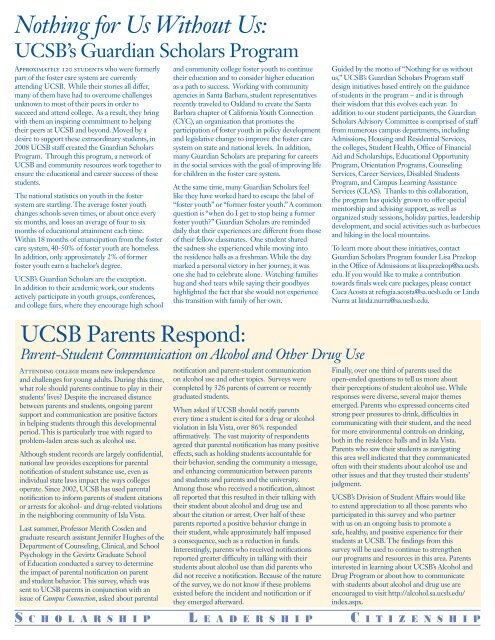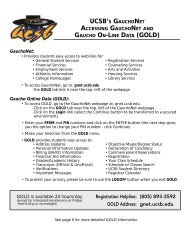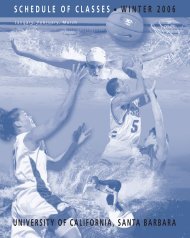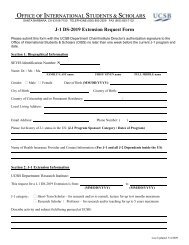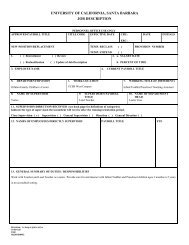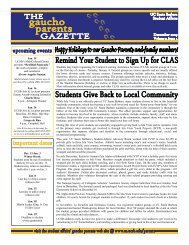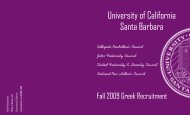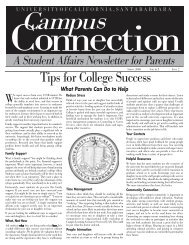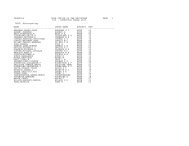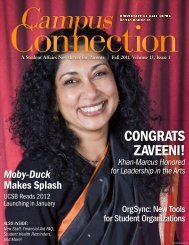GAUCHO GRADUATION 2011 - UCSB Division of Student Affairs ...
GAUCHO GRADUATION 2011 - UCSB Division of Student Affairs ...
GAUCHO GRADUATION 2011 - UCSB Division of Student Affairs ...
You also want an ePaper? Increase the reach of your titles
YUMPU automatically turns print PDFs into web optimized ePapers that Google loves.
Nothing for Us Without Us:<br />
<strong>UCSB</strong>’s Guardian Scholars Program<br />
Approximately 120 students who were formerly<br />
part <strong>of</strong> the foster care system are currently<br />
attending <strong>UCSB</strong>. While their stories all differ,<br />
many <strong>of</strong> them have had to overcome challenges<br />
unknown to most <strong>of</strong> their peers in order to<br />
succeed and attend college. As a result, they bring<br />
with them an inspiring commitment to helping<br />
their peers at <strong>UCSB</strong> and beyond. Moved by a<br />
desire to support these extraordinary students, in<br />
2008 <strong>UCSB</strong> staff created the Guardian Scholars<br />
Program. Through this program, a network <strong>of</strong><br />
<strong>UCSB</strong> and community resources work together to<br />
ensure the educational and career success <strong>of</strong> these<br />
students.<br />
The national statistics on youth in the foster<br />
system are startling. The average foster youth<br />
changes schools seven times, or about once every<br />
six months, and loses an average <strong>of</strong> four to six<br />
months <strong>of</strong> educational attainment each time.<br />
Within 18 months <strong>of</strong> emancipation from the foster<br />
care system, 40-50% <strong>of</strong> foster youth are homeless.<br />
In addition, only approximately 2% <strong>of</strong> former<br />
foster youth earn a bachelor’s degree.<br />
<strong>UCSB</strong>’s Guardian Scholars are the exception.<br />
In addition to their academic work, our students<br />
actively participate in youth groups, conferences,<br />
and college fairs, where they encourage high school<br />
and community college foster youth to continue<br />
their education and to consider higher education<br />
as a path to success. Working with community<br />
agencies in Santa Barbara, student representatives<br />
recently traveled to Oakland to create the Santa<br />
Barbara chapter <strong>of</strong> California Youth Connection<br />
(CYC), an organization that promotes the<br />
participation <strong>of</strong> foster youth in policy development<br />
and legislative change to improve the foster care<br />
system on state and national levels. In addition,<br />
many Guardian Scholars are preparing for careers<br />
in the social services with the goal <strong>of</strong> improving life<br />
for children in the foster care system.<br />
At the same time, many Guardian Scholars feel<br />
like they have worked hard to escape the label <strong>of</strong><br />
“foster youth” or “former foster youth.” A common<br />
question is “when do I get to stop being a former<br />
foster youth” Guardian Scholars are reminded<br />
daily that their experiences are different from those<br />
<strong>of</strong> their fellow classmates. One student shared<br />
the sadness she experienced while moving into<br />
the residence halls as a freshman. While the day<br />
marked a personal victory in her journey, it was<br />
one she had to celebrate alone. Watching families<br />
hug and shed tears while saying their goodbyes<br />
highlighted the fact that she would not experience<br />
this transition with family <strong>of</strong> her own.<br />
Guided by the motto <strong>of</strong> “Nothing for us without<br />
us,” <strong>UCSB</strong>’s Guardian Scholars Program staff<br />
design initiatives based entirely on the guidance<br />
<strong>of</strong> students in the program – and it is through<br />
their wisdom that this evolves each year. In<br />
addition to our student participants, the Guardian<br />
Scholars Advisory Committee is comprised <strong>of</strong> staff<br />
from numerous campus departments, including<br />
Admissions, Housing and Residential Services,<br />
the colleges, <strong>Student</strong> Health, Office <strong>of</strong> Financial<br />
Aid and Scholarships, Educational Opportunity<br />
Program, Orientation Programs, Counseling<br />
Services, Career Services, Disabled <strong>Student</strong>s<br />
Program, and Campus Learning Assistance<br />
Services (CLAS). Thanks to this collaboration,<br />
the program has quickly grown to <strong>of</strong>fer special<br />
mentorship and advising support, as well as<br />
organized study sessions, holiday parties, leadership<br />
development, and social activities such as barbecues<br />
and hiking in the local mountains.<br />
To learn more about these initiatives, contact<br />
Guardian Scholars Program founder Lisa Przekop<br />
in the Office <strong>of</strong> Admissions at lisa.przekop@sa.ucsb.<br />
edu. If you would like to make a contribution<br />
towards finals week care packages, please contact<br />
Cuca Acosta at refugia.acosta@sa.ucsb.edu or Linda<br />
Nurra at linda.nurra@sa.ucsb.edu.<br />
<strong>UCSB</strong> Parents Respond:<br />
Parent-<strong>Student</strong> Communication on Alcohol and Other Drug Use<br />
Attending college means new independence<br />
and challenges for young adults. During this time,<br />
what role should parents continue to play in their<br />
students’ lives Despite the increased distance<br />
between parents and students, ongoing parent<br />
support and communication are positive factors<br />
in helping students through this developmental<br />
period. This is particularly true with regard to<br />
problem-laden areas such as alcohol use.<br />
Although student records are largely confidential,<br />
national law provides exceptions for parental<br />
notification <strong>of</strong> student substance use, even as<br />
individual state laws impact the ways colleges<br />
operate. Since 2002, <strong>UCSB</strong> has used parental<br />
notification to inform parents <strong>of</strong> student citations<br />
or arrests for alcohol- and drug-related violations<br />
in the neighboring community <strong>of</strong> Isla Vista.<br />
Last summer, Pr<strong>of</strong>essor Merith Cosden and<br />
graduate research assistant Jennifer Hughes <strong>of</strong> the<br />
Department <strong>of</strong> Counseling, Clinical, and School<br />
Psychology in the Gevirtz Graduate School<br />
<strong>of</strong> Education conducted a survey to determine<br />
the impact <strong>of</strong> parental notification on parent<br />
and student behavior. This survey, which was<br />
sent to <strong>UCSB</strong> parents in conjunction with an<br />
issue <strong>of</strong> Campus Connection, asked about parental<br />
notification and parent-student communication<br />
on alcohol use and other topics. Surveys were<br />
completed by 326 parents <strong>of</strong> current or recently<br />
graduated students.<br />
When asked if <strong>UCSB</strong> should notify parents<br />
every time a student is cited for a drug or alcohol<br />
violation in Isla Vista, over 86% responded<br />
affirmatively. The vast majority <strong>of</strong> respondents<br />
agreed that parental notification has many positive<br />
effects, such as holding students accountable for<br />
their behavior, sending the community a message,<br />
and enhancing communication between parents<br />
and students and parents and the university.<br />
Among those who received a notification, almost<br />
all reported that this resulted in their talking with<br />
their student about alcohol and drug use and<br />
about the citation or arrest. Over half <strong>of</strong> these<br />
parents reported a positive behavior change in<br />
their student, while approximately half imposed<br />
a consequence, such as a reduction in funds.<br />
Interestingly, parents who received notifications<br />
reported greater difficulty in talking with their<br />
students about alcohol use than did parents who<br />
did not receive a notification. Because <strong>of</strong> the nature<br />
<strong>of</strong> the survey, we do not know if these problems<br />
existed before the incident and notification or if<br />
they emerged afterward.<br />
Finally, over one third <strong>of</strong> parents used the<br />
open-ended questions to tell us more about<br />
their perceptions <strong>of</strong> student alcohol use. While<br />
responses were diverse, several major themes<br />
emerged. Parents who expressed concerns cited<br />
strong peer pressures to drink, difficulties in<br />
communicating with their student, and the need<br />
for more environmental controls on drinking,<br />
both in the residence halls and in Isla Vista.<br />
Parents who saw their students as navigating<br />
this area well indicated that they communicated<br />
<strong>of</strong>ten with their students about alcohol use and<br />
other issues and that they trusted their students’<br />
judgment.<br />
<strong>UCSB</strong>’s <strong>Division</strong> <strong>of</strong> <strong>Student</strong> <strong>Affairs</strong> would like<br />
to extend appreciation to all those parents who<br />
participated in this survey and who partner<br />
with us on an ongoing basis to promote a<br />
safe, healthy, and positive experience for their<br />
students at <strong>UCSB</strong>. The findings from this<br />
survey will be used to continue to strengthen<br />
our programs and resources in this area. Parents<br />
interested in learning about <strong>UCSB</strong>’s Alcohol and<br />
Drug Program or about how to communicate<br />
with students about alcohol and drug use are<br />
encouraged to visit http://alcohol.sa.ucsb.edu/<br />
index.aspx.<br />
S c h o l a r s h i p L e a d e r s h i p C i t i z e n s h i p


